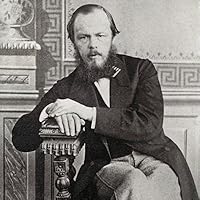

“Nature creates few men brave, industry and training makes many.”
― The Prince
― The Prince

“In any society where government does not express or represent the moral community of the citizens, but is instead a set of institutional arrangements for imposing a bureaucratized unity on a society which lacks genuine moral consensus, the nature of political obligation becomes systematically unclear.”
― After Virtue
― After Virtue

“He was in the hospital from the middle of Lent till after Easter. When he was better, he remembered the dreams he had had while he was feverish and delirious. He dreamt that the whole world was condemned to a terrible new strange plague that had come to Europe from the depths of Asia. All were to be destroyed except a very few chosen. Some new sorts of microbes were attacking the bodies of men. Whole villages, whole towns and peoples went mad from the infection. All were excited and did not understand one another. All men and all things were involved in destruction. The plague spread and moved further and further. Only a few man could be saved in the whole world.”
― Crime and Punishment
― Crime and Punishment

“Lightning and thunder require time, the light of the stars requires time, deeds require time even after they are done, before they can be seen and heard.”
― The Gay Science: With a Prelude in Rhymes and an Appendix of Songs
― The Gay Science: With a Prelude in Rhymes and an Appendix of Songs

“R.G.: The more people think that they are realizing the Utopias dreamed up by their desire – in other words, the more they embrace ideologies of liberation – the more they will in fact be working to reinforce the competitive world that is stifling them. But they do not realize their mistake; and continue to systematically confuse the type of external obstacle represented by the prohibition and the internal obstacle formed by the mimetic partner...
At the very moment the last prohibitions are being forgotten, there are still a number of intellectuals who continue to refer to them as if they were more and more crippling...
G.L.: You are going to get yourself branded as a dreadful reactionary again.
R.G.: That would not be at all fair. I do find it absurd that people should greet with a fanfare the liberation of a desire that is not being constrained by anyone. But I find it even more absurd to hear people calling for a return to constraints, which is impossible. From the moment cultural forms begin to dissolve, any attempt to reconstitute them artificially can only result in the most appalling tyranny.”
― Things Hidden Since the Foundation of the World
At the very moment the last prohibitions are being forgotten, there are still a number of intellectuals who continue to refer to them as if they were more and more crippling...
G.L.: You are going to get yourself branded as a dreadful reactionary again.
R.G.: That would not be at all fair. I do find it absurd that people should greet with a fanfare the liberation of a desire that is not being constrained by anyone. But I find it even more absurd to hear people calling for a return to constraints, which is impossible. From the moment cultural forms begin to dissolve, any attempt to reconstitute them artificially can only result in the most appalling tyranny.”
― Things Hidden Since the Foundation of the World
Andrew’s 2025 Year in Books
Take a look at Andrew’s Year in Books, including some fun facts about their reading.
More friends…
Favorite Genres
Art, Biography, Christian, Classics, History, Memoir, Non-fiction, Philosophy, Psychology, Religion, Spirituality, and Economics
Polls voted on by Andrew
Lists liked by Andrew
































